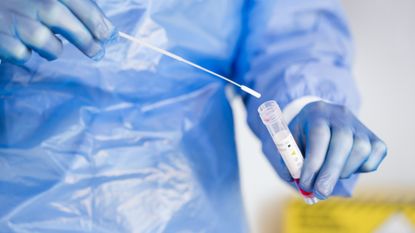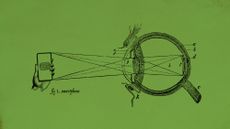How quickly can you catch Covid again?
Scientists say a woman was infected with two different strains of the virus within three weeks

A 31-year-old Spanish woman has caught Covid twice within 20 days, the shortest documented gap between infections, scientists have said.
The healthcare worker became infected with the Delta variant followed by the Omicron strain of the virus in under three weeks. Researchers say the case shows that even vaccinated people who have had Covid-19 recently “cannot assume they are protected against reinfection”.
The woman, whose name has not been released publicly, was “fully vaccinated and had received a booster shot 12 days earlier”, reported The Guardian. She tested positive in a PCR staff screening test at work on 20 December 2021. She “didn’t develop any symptoms, and self-isolated for 10 days before returning to work”.
Subscribe to The Week
Escape your echo chamber. Get the facts behind the news, plus analysis from multiple perspectives.

Sign up for The Week's Free Newsletters
From our morning news briefing to a weekly Good News Newsletter, get the best of The Week delivered directly to your inbox.
From our morning news briefing to a weekly Good News Newsletter, get the best of The Week delivered directly to your inbox.
Then, on 10 January 2022, she “developed a cough, fever and felt generally unwell and did another PCR test”, which came back positive again.
Whole genome sequencing showed that the patient had been “infected by two different Covid variants”, said the paper. The healthcare worker had first been infected with the Delta variant before then contracting the Omicron virus, “which is known to be more infectious and can evade immunity from past infections and vaccination”.
Dr Gemma Recio, of the Institut Català de la Salut in Tarragona and one of the study’s authors, said: “This case highlights the potential of the Omicron variant to evade the previous immunity acquired either from a natural infection with other variants or from vaccines.”
She added that the use of genomic sequencing “will help detect variants with the ability to partially evade the immune response”.
The case, which is set to be presented to the European Congress of Clinical Microbiology and Infectious Diseases in Portugal, is “believed to be the shortest known gap between infections”, said Sky News.
How soon can you be reinfected with Covid-19?
Previously in the UK, if you tested positive for any variant of Covid-19 within a 90-day time period it was “considered to be part of the same case episode”, said the i news site. Testing positive weeks after an initial positive test was likely to be from the “residual effects of the initial infection”, while tests outside the 90-day period were counted as a reinfection.
But with Omicron now the dominant variant, those who have been infected with other variants like Alpha, Beta and Delta are at risk of reinfection because Omicron is better at evading immunity from past infections. A study published in December by the World Health Organisation (WHO) and Imperial College London found Omicron was “five times more likely to reinfect people than Delta”.
However, it is “possible” that prior infection with Omicron will make reinfection less likely, “especially so quickly” after an initial infection, said The Guardian.
“We can expect further waves of infection especially during winter even without new variants,” Paul Hunter, a professor in medicine at the University of East Anglia, told the paper.
“Fortunately the evidence is that immunity to severe disease is more robust than immunity to infection. So even though reinfections will continue to occur for many years, we will see fewer and fewer severe illnesses and deaths with time.”
Create an account with the same email registered to your subscription to unlock access.
Sign up for Today's Best Articles in your inbox
A free daily email with the biggest news stories of the day – and the best features from TheWeek.com
-
 5 high-caliber cartoons about Kristi Noem shooting her puppy
5 high-caliber cartoons about Kristi Noem shooting her puppyCartoons Artists take on the rainbow bridge, a farm upstate, and more
By The Week US Published
-
 The Week Unwrapped: Why is the world running low on blood?
The Week Unwrapped: Why is the world running low on blood?Podcast Scientists believe universal donor blood is within reach – plus, the row over an immersive D-Day simulation, and an Ozempic faux pas
By The Week Staff Published
-
 Rishi Sunak's asylum spat with Ireland explained
Rishi Sunak's asylum spat with Ireland explainedIn Depth Irish government plans to override court ruling that the UK is unsafe for asylum seekers
By The Week UK Published
-
 Covid four years on: have we got over the pandemic?
Covid four years on: have we got over the pandemic?Today's Big Question Brits suffering from both lockdown nostalgia and collective trauma that refuses to go away
By Chas Newkey-Burden, The Week UK Published
-
 How happy is Finland really?
How happy is Finland really?Today's Big Question Nordic nation tops global happiness survey for seventh year in a row with 'focus on contentment over joy'
By Harriet Marsden, The Week UK Published
-
 The hollow classroom
The hollow classroomOpinion Remote school let kids down. It will take much more than extra tutoring for kids to recover.
By Mark Gimein Published
-
 Excess screen time is making children only see what is in front of them
Excess screen time is making children only see what is in front of themUnder the radar The future is looking blurry. And very nearsighted.
By Devika Rao, The Week US Published
-
 Covid-19: what to know about UK's new Juno and Pirola variants
Covid-19: what to know about UK's new Juno and Pirola variantsin depth Rapidly spreading new JN.1 strain is 'yet another reminder that the pandemic is far from over'
By Arion McNicoll, The Week UK Published
-
 Does declining birth rate spell doom for Britain?
Does declining birth rate spell doom for Britain?Today's Big Question Ageing population puts pressure on welfare state, economy and fabric of society, while fertility is rising on populist agendas
By Harriet Marsden, The Week UK Published
-
 Long-term respiratory illness is here to stay
Long-term respiratory illness is here to stayThe Explainer Covid is not the only disease with a long version
By Devika Rao, The Week US Published
-
 Covid inquiry: the most important questions for Boris Johnson
Covid inquiry: the most important questions for Boris JohnsonTalking Point Former PM has faced weeks of heavy criticism from former colleagues at the public hearing
By The Week Staff Published